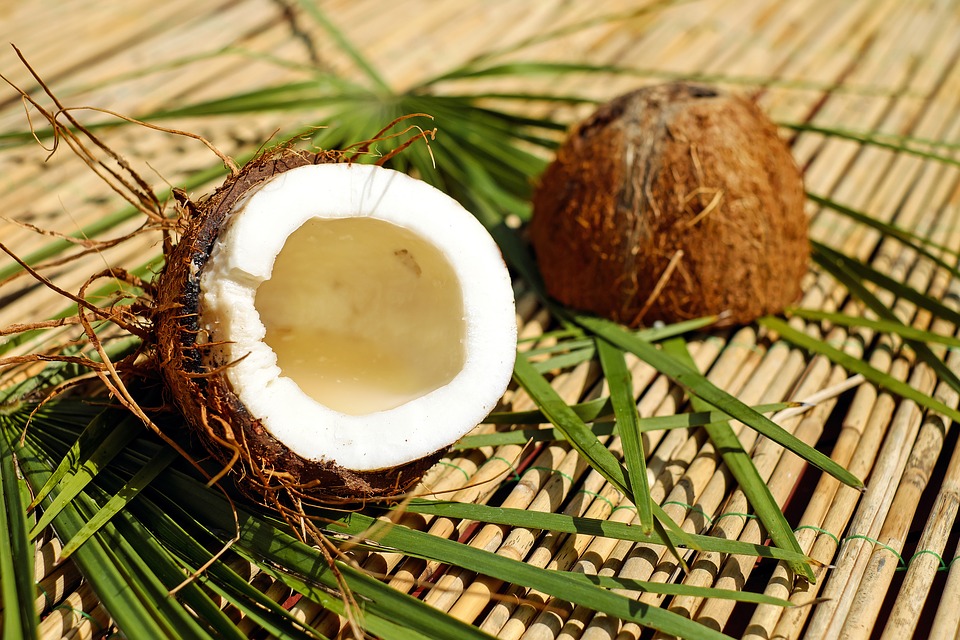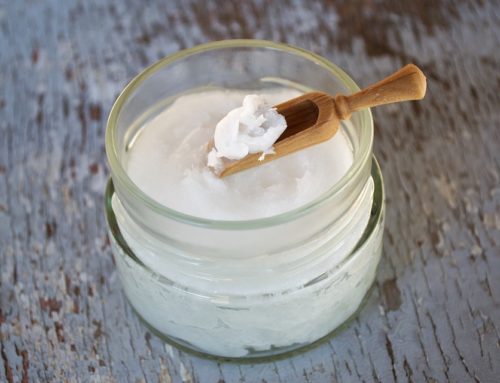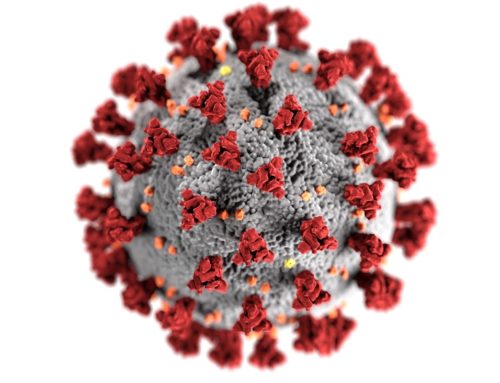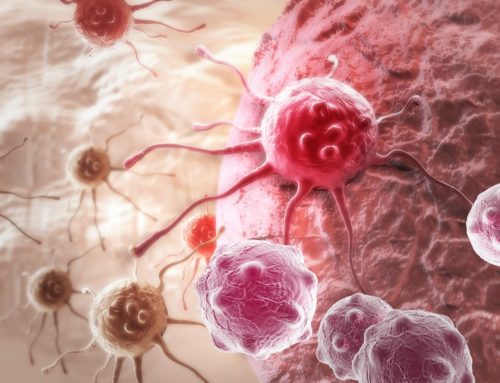A slow thyroid gland: Beware of too many monounsaturated fatty acids
 Too many monounsaturated fatty acids will suppress the release of the thyroid gland’s hormones. Researchers have known since 1950 that an excess of monounsaturated fatty acids will slow down the metabolism and could cause a slow thyroid gland. The oestrogen levels could rise and the progesterone and pregnenolon levels could decrease. (94) Too many monounsaturated fatty acids could reduce the functioning of our powerhouses in the cells (the mitochondria): By suppressing the functioning of certain enzymes and by a shortage of antioxidants, as a result of the excess oxidation of the sensitive monounsaturated fatty acids. The more monounsaturated fatty acids that we consume, the worse our cells will react to thyroid gland hormones. (132)
Too many monounsaturated fatty acids will suppress the release of the thyroid gland’s hormones. Researchers have known since 1950 that an excess of monounsaturated fatty acids will slow down the metabolism and could cause a slow thyroid gland. The oestrogen levels could rise and the progesterone and pregnenolon levels could decrease. (94) Too many monounsaturated fatty acids could reduce the functioning of our powerhouses in the cells (the mitochondria): By suppressing the functioning of certain enzymes and by a shortage of antioxidants, as a result of the excess oxidation of the sensitive monounsaturated fatty acids. The more monounsaturated fatty acids that we consume, the worse our cells will react to thyroid gland hormones. (132)
Slow thyroid gland
Too much cholesterol and too much homocysteine
A slow thyroid gland can be the reason for excess homocysteine in blood. Because a slow thyroid gland means the body absorbs less vitamin B. And vitamin B shortages will cause higher homo cysteine levels. A high homocysteine level could be a risk factor for cardiovascular disease. Since 1930 researchers are also aware that a slow thyroid gland can raise cholesterol levels and that you can reduce these levels by activating the thyroid gland. This is because the thyroid gland will incite cholesterol to form hormones and gall acids. (132)
Coconut oil and its MCTs: For those who wish to lose weight
The medium chain fatty acids (MCTs) in coconut oils will provide more energy than the LCTs (long chain fatty acids) and are broken down faster than LCT fats (83, 84), which results in a double benefit: More energy and less fat storage. An ideal solution to lose weight or achieve a better muscle/fat ratio. Research shows that MCTs can raise the metabolism by 12% compared to 4% with LCTs. This is great news for people who want to lose weight and people with a slow thyroid gland (108). LCTs such as peanut oil and sesame oil are stocked faster than fats and will become rancid faster through oxidation. Rancid fats cause damage to cellular membranes. As a result they suppress the conversion of the T4 thyroid gland hormone into the more active T4-thyroidal hormone, which is expressed in a slower thyroid gland. Coconut MCTs will not do this. Dr. R. Peat, a hormone specialist, recommends using coconut oil, extra virgin olive oil and butter in case of a thyroid problem. The thyroid gland also requires sufficient amounts of vitamin A, which the body can produce from sufficient carotenoids obtained from red palm oil.
Weight loss: With MCTs from extra virgin coconut oil
The cattle industry has shown that it is hard to fatten animals with MCTs (coconut oil). If we try to do this with LCTs such as monounsaturated fatty acids from saffl ower oil or fi sh oil for example, then this is easier to achieve. MCTs are difficult to store as fat. Instead they are broken down and used as energy. If the cattle industry wishes to produce lean pork, then it will start feeding the pigs saturated fats during the last phase. Coconut is the richest source of saturated fatty acids (90). If farmers want to fatten animals, they will obtain more success with long chain fatty acids, such as those contained in fish oil and animal fats.
Animals with a diet high in MCTs will store 60% less fat than animals with a diet low in MCTs but eating the same calories (92). In other words: a fat-reduced diet will make you lose less weight than a diet with sufficient MCTs and MCTs are stockpiled less than LCTs. Coconut oil is the richest source of MCTs. But Americans haven’t real ized this yet. Since they have massively switched to monounsaturated fatty acids, they have become the fattest nation worldwide. Monounsaturated fatty acids have long chain fatty acids, which are stored as fats and which are only used in last instance as energy because they are harder to break down.
Electromagnetic energy of 1 drop of extra virgin coconut oil Fats rich in monounsaturated fatty acids include:
Fish oil, linseed oil, evening primrose oil, safflower oil, sunflower oil, soya oil, hemp oil, corn oil, pumpkin seed oil, sesame oil, etc.
Fats rich in long chain fatty acids include:
Fats from animals, butter (mainly containing saturated fats), olive oil, canola or rapeseed oil (which contain a lot of monounsaturated fats) and of course all the aforementioned monounsaturated fatty acids: Fish oil, evening primrose oil, linseed oil, soya oil, sunflower oil, safflower oil, corn oil, peanut oil, etc.
More energy and a higher combustion with MCTs from coconut oil
In a study among male test subjects the metabolism rose by 12% due to MCTs, while LCTs only increased the metabolic rate by a mere 4%. This means that more energy is produced and that more calories are burnt with MCTs from coconut oil. This is good for your weight and good for your vitality. Researchers state that when LCT fats (such as sunflower oil and olive oil for example) are replaced in an eating pattern by MCT fats, this will result in weight loss in the long term. (93)
Losing weight with MCTs from coconut oil
It is possible to say that coconut oil helps lose weight, or at the least gain it as a lesser pace.
- MCTs contain 10% less calories than other fats.
It is widely accepted that all fats contain 9.2 calories per gram (for example olive oil or butter). This is not quite correct. The MCTs in coconut oil only contain 8.3 calories per gram, which is 10% less. What can this mean in theory? In a 2,000 cal diet with 30% fat, 600 calories will come from fats. If these are all from MCTs then this could mean that the body’s effective intake is only 540 calories (60 calories a day). If we multiply this by 365 days, then this results in calorie savings of 21,900 calories. This amounts to almost 3 kilos of fat or 8 to 10 kilos of body fat. In practice this could mean that if we replace 30% of our fats by coconut oil, that we could save 2 to 3 kilos of body weight per year. For many people these are the kilos that they have to deal with on an annual basis. - MCTs are stockpiled at a slower pace and burnt faster. We will store what we eat too much of. Everyone will agree on this point. But not all nutrients are stored as easily. MCTs from coconut oil will be used as energy first. The effect of losing weight by consuming coconut oil has been demonstrated by several researchers. (25,26,27) Does this mean that if we replace certain fats with coconut oil we will lose weight faster? Yes, and it gets even better.
An extensive report from 2002 by Marie-Pierre St-Onge and Peter Jones of the McGill University, Quebec, Canada, discussed how obesity could be treated with MCTs. (5) The authors studied 30 studies and concluded that MCTs have positive effects on the metabolism, the feeling of saturation, the body weight. In most studies researchers noticed that the metabolic rate (more energy and higher combustion) had increased after an intake of 30 to 40% fats from coconut oil MCTs. In Spain researchers arrived at the conclusion in 1998 that coconut oil reduced the fat reserves in rats.
Extra virgin coconut oil and your weight:
1) Coconut oil in comparison to other fats contains fewer calories.
2) Coconut oil is mainly used as energy.
3) Coconut oil is barely stocked as fat.
4) Coconut oil ensures more thermogenesis.
5) Coconut oil ensures more calories are burnt (due to a higher metabolic rate).
6) Coconut oil also ensures that other fats burn faster (28)
Coconut oil and fasting
A Dutch master in combat sports and yoga is living on raw food. He is extremely energetic, healthy and in balance. Every year he will follow a 2-week fasting cure using Pineo water and coconut oil. This purifies his body and soul, keeps his body tight and gives him more spiritual depth. What does the cure consist of? 1 to 2 litres of water a day – initially 2 litres and gradually less – and 3 tablespoons of coconut oil a day as a meal, which he swishes in his mouth for some time. And nothing else. This is just as easy as eating less. And it gives your body the opportunity to heal itself and restore its balance. The animal kingdom has excellent examples of fasting animals.
For a better control of your weight replace part
of the sugars in your diet with coconut oil
The more carbohydrates (bread, pasta, potatoes) and sugars that you manage to replace with extra virgin coconut oil, the less your glycaemic index will vary! This means you will be saturated for longer, you will feel less hunger pangs between meals, less hungry at your next meal and that you will be able to better control your weight. Simple: Replace carbohydrates and sugars in the morning, at lunch and at dinner by one coffee spoon (preferably one tablespoon) of coconut oil. And that’s all you need to do.
Coconut oil: The secret ingredient in your protein diet
 No sugar, fewer carbohydrates, more proteins and sufficient fats are all you need to make a protein diet succeed. Short sugars especially will rapidly increase the gly caemic index, which is often followed by another low, with feelings of hunger. The objective is to avoid such ups and downs. Protein will not influence the glycaemic index. Coconut oil will reduce certain ups and downs in the glycaemic index and will ensure that you feel less hunger pangs between meals. Coconut oil will also ensure that you leave the table sooner with a sense of saturation, will raise your energy levels and metabolic rate. Thus coconut oil is the secret ingredient which will give your protein diet a chance of success. Adding coconut oil to your meals will prevent you from overeating and snacking in between meals.
No sugar, fewer carbohydrates, more proteins and sufficient fats are all you need to make a protein diet succeed. Short sugars especially will rapidly increase the gly caemic index, which is often followed by another low, with feelings of hunger. The objective is to avoid such ups and downs. Protein will not influence the glycaemic index. Coconut oil will reduce certain ups and downs in the glycaemic index and will ensure that you feel less hunger pangs between meals. Coconut oil will also ensure that you leave the table sooner with a sense of saturation, will raise your energy levels and metabolic rate. Thus coconut oil is the secret ingredient which will give your protein diet a chance of success. Adding coconut oil to your meals will prevent you from overeating and snacking in between meals.
Add at least one coffee spoon (preferably 1 tablespoon) of coconut oils to all your meals in a protein diet. You will lose weight faster and easier.
No fast carbs, no refi ned sugars in your protein diet, but coconut oil.
All healthy and unrefined fats, with a preference for MCT fats from coconut oil, will fortify a protein diet. If you experience tomorrow that you have less ups and downs in your glycaemic index, less hunger pangs, then you will see that losing weight will become much easier. Coconut oil will facilitate your protein diet by adding coconut fats to healthy carbohydrates, so that these barely affect your glycaemic index (hunger and hunger pangs) at all or to a lesser extent. This will make the protein diet a little bit more accessible and easier. Coconut oil will help you succeed in your protein diet.
When eating healthy carbs you can add some coconut oil or even prepare them with coconut oil: No white bread, white rolls or baguette but pumpernickel or other whole-wheat breads, spread with coconut oil, no white rice but whole rice (for example basmati) and a bit of coconut oil, no cornflakes or rice crispies but oatmeal, no white or brown sugar but moderate amounts of agave or corn syrup, no dried dates, figs, raisins, or bananas, but apples, pears, grapefruit. dried dates, figs, raisins, or bananas, but apples, pears, grapefruit. No sugar-free chocolate but moderate amounts of chocolate with 70% or better yet 85% of cocoa. No fries or potato mash but moderate amounts of jacket potato. No pre-process foods but traditional basic foods. These carbohydrates become accessible with coconut in any protein diet. Organic eggs, and to a limited extent certain cheeses (for example raw cheeses and cottage cheese).
You should only choose healthy protein-rich foods: Various pulses (lentils, adzuki beans, soya, etc.), protein-rich vegetables such as watercress, germs, soy shoots, wheat germs, spinach, asparagus, broccoli and salad. Be careful with parsnips, boiled carrots and pumpkin. Use herbs abundantly. You could but don’t have to include organic chicken, pork, beef and lamb, venison and fresh small deep sea fi sh. Don’t forget to eat some nuts.
Tip: Fast sugars are turned into slow sugar with coconut oil Did you know that if you start adding healthy fats to fast sugar or fast carbohydrates that they are turned into slow sugars and slow carbs? Because fat slows down digestion and ensures that fast sugars are released slowly. A good tip if you want to have a little binge, without being trapped by attacks of hunger.
Warning: On principle I am against all chemical or artificial sugars. They have no impact on the glycaemic index but can harm your health. A protein diet teeming with chemical sweeteners is like being on a diet and smoking at the same time. These chemicals tend to prevent the absorption of healthy substances, have a laxative effect and will make your breath smell. You will lose weight but you will not be any healthier for it. This cannot be the objective; it is not very intelligent.
Coconut oil will help you lose weight and solve several health problems.
Coconut oil will help you be slim, healthy and full of vitality. Coconut oil is an easily degrada- ble fat that ensures more energy and less fat storage. Moreover, according to Dr. Robert Atkins, 20% of the people who do not lose weight with his Atkins diet have a fungus infection in their in- testine. Coconut will help prevent fungus infections; they will disappear and your resistance will improve. Coconut is good for you… moreover coconut oil cures a lot of stomach and intestinal issues, will combat viruses and bacteria and stimulate your thyroid gland. Coconut oil will give you soft skin and more libido.
‘Fat promotes the production of testosterone and that is the most important muscle building hormone’ ‘The washboard diet’, David Zinczenko and Ted Spiker. And without testosterone, men and women have no libido.
Losing weight ‘When the body is put on a fat-reduced diet for a long period of time, the weight loss will stop’, according to Doctor and epidemiologist W. Willet. In the Int. Journal of Obesity researchers from Brigham, Boston and Harvard University arrived at the conclusion that you lose less weight when on a fat-reduced diet (20% fats) than on a diet with 35% of your calorie intake from fats.
Conclusion: Without sufficient healthy fats you can never achieve a healthy and slim body.
The coconut oil diet: Eat healthy fats and lose fats
The coconut oil diet will get you back on track as nature wants it. Traditional basic foods with sufficient amounts of healthy fats. You will notice that the hours go by without hunger attacks. That your gly- caemic index is under control and that hunger will disappear after meals due to the saturated feeling as a result of the healthy fats. Coconut oil will ensure that the brain is given signals in the stomach and in the small intestine, so that you feel satisfi ed. Meals with healthy coconut fats taste good and make your diet fun. Coconut oil is broken down rapidly into energy fi rst and foremost, and is then stored as healthy fats. Studies of the last 15 years in Italy, Japan, the USA, Canada, Belgium, Germany, the Czech Republic and France confi rm that coconut oil will raise energy levels and stimulates weight loss.
The Middlesex Hospital in London tested four 1,000 cal di- ets: 90% fat, 90% protein, 90% carbohydrates and a varied diet. The people who were on the 90% fat diet lost signifi cantly more weight than the people on the other diets. The Finnish lumberjacks are living proof of this. 50% of their calorie intake comes from saturated fats and they are by no means fat. Fats contain up to 2 times more calories per gram than protein or carbs (sugar), but will alleviate your hunger 4 to 5 times faster. This is one of the reasons why people who eat healthy fats lose weight faster or stay slim. Dr. H. Newbold, Type A and Type B, weight loss book.
Dr. G. Frost of the Hammersville Hospital in London stated on the BBC on 14.03.05 that obesity needs to be dealt with by replacing unhealthy ingredients in processed food and junk food with healthier alternatives. Coconut oil is such a healthy alterna- tive.
What causes overweight?
- Eating food high in calories, without any nutritional value such as dry biscuits, all types of candy bars, croissants and carbonated drinks with a lot of sugar. Calories are stored but your body continues to look for nutritional value such as vitamins, miner- als, enzymes, etc. The calories are there but you still feel hungry.
- A thyroid gland that is working insufficiently, which means we burn less calories than is customary.
- Too many sugars and refined carbs, which make your glycaemic index go up rapidly, but make it crash just as rapidly and thus trigger hunger attacks. You continue to yo-yo between ecstasy and hunger.
- Too many unhealthy fats such as refined vegetable supermarket oil, frying oil, margarines and heated monounsaturated fats with transfats and all types of products in which these unhealthy fats have been used. These complicate the metabolic breakdown of fat and suppress our energy levels.
- Being unable to cope with stress. Stress hormones increase your insulin production and make you store more food and calories.
- Insufficient exercise. Exercise stimulates fat burning, also after exercising.
Coconut oil and losing weight
The secret of coconut is in the MCTs
The secret of coconut oil is in the shorter chain length of its fats. These are mainly middle chain fatty acids, also known as MCTs.
- MCTs are rapidly broken down in the body and will almost immediately be con verted into energy. (102) A study conducted in 2000 confi rmed that MCTs are broken down three times as fast as LCTs, or long chain fatty acids. (American Journal of Clinical Nutrition). A study was published in this same journal in 1999, which indi cated that when you replace LCTs with MCTs from coconut oil, this will increase your body temperature and activate your thyroid gland, which in turn will result in higher calorie burning.
- Fat storage is barely given a chance because coconut oil is better suited than any other oil to kick-start your metabolism and metabolic rate. (104) In other words: MCTs burn quickly and lesser amounts are stored as fat. According to Mary Enig MCTs are not easily used by the body for fat storage. An interesting property of MCTs is that they stimulate fat burning with more energy. That is why the traditional popu- lation of Polynesia manages to stay thin in spite of its diet, which is rich in fats. (105) In contrast long chain fatty acids, such as those in fi sh, animals and many vegetable oils, are digested slowly, broken down slowly and easily stored as fat. (103). The research by the McGill University into obesity stated that MCTs (60% in coconut oil) can be an ideal tool for weight loss.
- The coconut diet allows you to enjoy healthy fats and will try to ban unhealthy fats from your life. Unhealthy fats slow down your metabolism and make people fat and sick. Don’t forget that almost all processed products such as biscuits and readymade meals contain unhealthy fats. Unhealthy fats have no taste and are cheaper, which is why they are used more frequently.
Coconut oil and athletes, ideal for the Lean Body diet and the Weight Gain diet
Athletes can boost their training with extra virgin coconut oil and integrate it as a major asset in their food habits. These fats promote protein absorption, fat burning and the absorption of minerals. (14,15,16) Both in the Weight Gain diet, whereby athletes will try to build more muscle mass and in the Lean Body diet whereby athletes will work on achieving a better bone/muscle ratio compared to fat mass. Bodybuilders often use coconut oil in the phase prior to a competition, where every- thing is done to ensure that the muscles are as defined as possible.
Coconut oil is the richest source of MCTs of fats with medium chain fatty acids. Per gram they contain up to two times more energy than protein or carbs. But these MCTs are barely stored in the body as fat; rather they are burnt quickly and are available as energy for more training. The coconut oil MCTs do not require any carnitine to be burnt. As a result they ensure a better bone/muscle to fat ratio and they can help build muscle mass.
They ensure that athletes do not find themselves in a catabolic situation during heavy training. Catabolic is the situation whereby muscle protein is being broken down to be used as energy supplies. When the body is active, it will fi rst use glucose and the sugar supplies in cells (glycogens). These will have been exhausted after 1 or 2 hours of training. If you are unable of using your body fats at that moment, then the chances are that you will fi nd yourself in a catabolic situation and that you will start breaking down muscle proteins for energy. The MCTs in coconut oil provide super fast and easily available energy in the form of easily digestible medium chain fatty acids.
In other words: coconut oil will ensure larger energy supplies so that you can train or do sports without breaking down muscle tissue. Athletes have sugars and MCTs as fast energy supplies at their disposal now. Other fats are not suited for this because they are stored in first instance and are only used in emergencies as energy supplies. Coconut oil will also increase athletes’ stamina. Because as long you have sufficient sugars and easily degradable MCTs at your disposal, you can continue to exercise and perform. Coconut oil has a harmonizing influence on your glycaemic index and will promote the absorption of minerals and amino acids (proteins). It is ideal in protein or milk whey shakes, weight gain shakes, egg dishes and in soup. Moreover coconut is delicious and easy to use in anything you prepare. Use 3 to 6 coffee spoons a day, in 3 to 6 meals, or with a higher concentration for maximum performance: 1 hour before training or the competition or immediately afterwards to prevent the breakdown of proteins. Coconut oil is liquid from 25°C. Top athletes generate a lot of free radicals in the body due to physical stress, and the amount of oxygen used. Top sports without additional protection against free radicals will age you. Moderate sports will keep you young. Coconut oil can help you because these fats are not susceptible to oxidation and because they help increase our resistance with their antimicrobial function. Adding red palm oil with its rich source of carotenes and vitamin E can moreover boost antioxidants.
Transfats will prevent muscles from forming.
Transfats prevent the building of muscle tissue and can bring about protein shortages. (182) This is due to the fact that muscles require prostaglandins (a type of hormone) to be formed and that these prostaglandins are formed from essential fatty acids. As transfats complicate this conversion or even prevent it, the link is easy to make. Extra virgin coconut oil does not contain any transfats. Another reason for cooking with coconut oil. Essential fatty acids are alpha-linolenic acid and linoleic acid (omega 3 and 6).
The extra virgin coconut oil diet
Eat three meals a day and don’t miss breakfast. Eat healthy food and limit your calorie intake. Add coconut oil to every meal. You will eat properly and feel better, not feel the compulsion to snack in between meals and leave the table feeling satisfied. Preferably eat unrefined foods, eat a lot of vegetables and fruit, regularly eat whole- wheat and germinated cereals, don’t use refined salt, but sea or rock crystal salts, use a lot of herbs and spices. Don’t forget pulses, nuts and fermented foods. Use stainless steel or enamel cookery ware. Non-stick pans are off-limits. If you choose to drink or eat milk products then take raw cheeses, raw milk and yoghurts with living lactic acid bacteria. Give preference to semi-skimmed or whole milk products. Don’t use light products as they are not as healthy and will not help you lose weight. Eat sufficient amounts of raw foods and don’t steam or cook everything. Only eat fish, meat or poultry of good organic or free-range quality. Add a dessert to every meal and better yet a tablespoon of extra virgin coconut oil. 3 tablespoons of coconut oil will have a therapeutic effect on your thyroid gland and fat burning rate. Don’t forget your vegetable essential omega 3/6!
The higher the health value of what you are eating, the less you will feel the need to satisfy your urge for essential nutrients. Refined food will kill of your cells a little bit, they will reduce your vitality and give you very little in return.










